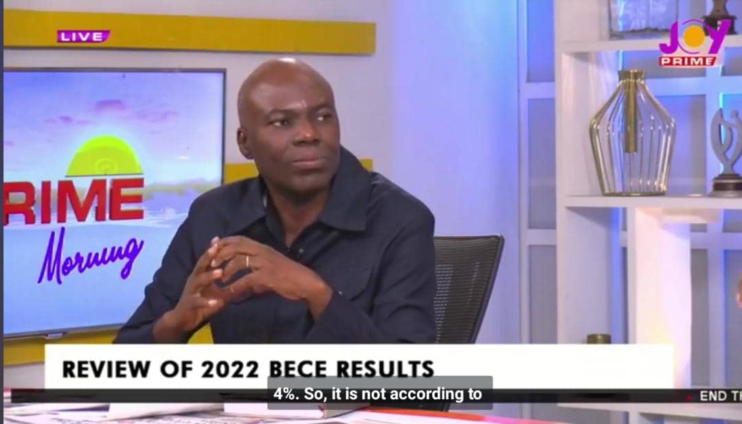The Head of the Legal Department of the West African Examinations Council, Rev. Victor Brew, has clarified the grading system used for the Basic Education Certificate Examination (BECE).
According to him, the performance of students at various schools determine their grades. The grades awarded to students from various schools are dependent on their performance.
Speaking to Roselyn Felli on Prime Morning, Monday, Rev. Victor Brew explained that students who may be the best in their schools may not meet the first 4% range targeted by the WAEC grading system as it is a nationwide competition.
"...it's the grading system and also the performance of their candidates, because mind you, if you're a local champion where you keep getting 80s, know that if someone else has been getting 99, then you pray that your 80 falls within the 4% otherwise, you're going to get a grade 2, and that doesn't mean you're not good. You’re good, but others are better," he explained.
For the purpose of the variation of the grading system, he urged school managers to avoid comparing cohorts of their institutions, as the "Norm-Referenced Grading System" used by WAEC varies yearly.
Rev. Victor Brew further revealed that the implementation of the grading system is done in collaboration with the government, thus making grade 9 the lowest and not a failure in the BECE system.
Explaining how the grading system is done, he said, "If the first 4% are to get grade 1, what it means is that if you took mathematics, unlike English, someone can get 100% in mathematics. So, what happens is that your candidate or the champion of your school in math gets 80% during your mock trials or 89%, but then when you join forces with the candidates across the country, the question is whether your champion in math in your school can beat all the champions across the country such that your champion falls within the first 4%."
For this reason, he said WAEC is not to be blamed for the failure of candidates, as a particular batch may not fall within the range of the national grading system for the year.
Meanwhile, he thinks a coalition of a total number of candidates acquiring a grade in each subject across the country within a year will inform policy-making so as to help improve the system.
Addressing the issue of the cancellation of the exams for some candidates, he said it is done based on the rules and regulations provided for the year groups before and during the exams.
He has also notified parents whose children’s papers have been cancelled that they are permitted to appeal for remarking.
Latest Stories
-
CMCE, ActionAid Ghana sensitises community-based violence teams on conflict
8 minutes -
Minority considers Mahama impeachment over constitutional breaches
15 minutes -
Asutifi North District achieves open-defecation-free status, 90% district-wide water coverage
20 minutes -
QNET expresses deep concern over misuse of its name in Ghana kidnapping incident
32 minutes -
New gas processing plant will be a game-changer for Ghana – Finance Minister
48 minutes -
Illegal mining fight: 99 excavators retrieved, 208 suspects so far arrested
57 minutes -
Seka Group to establish groundbreaking expo-city shopping centre in Ghana
59 minutes -
‘Men need not fear Fertility Test’
1 hour -
Taiwo Awoniyi undergoes successful surgery after abdominal Injury
1 hour -
Over-the-counter medicine sellers pledge to help curb abuse of opioids
1 hour -
Ghana’s Black Satellites fall short of World Cup, but shine bright in Egypt
2 hours -
Dafeamekpor sues Ntim Fordjour for defamation over bribery allegation
2 hours -
Journey from Beijing to Accra to reveal how local entrepreneurs can fuel national development – Dr Ampong writes
2 hours -
Imperial General Assurance supports Korle Bu Hospital to provide 24-hour Radiology Services
2 hours -
Government to establish university at Kintampo
2 hours

